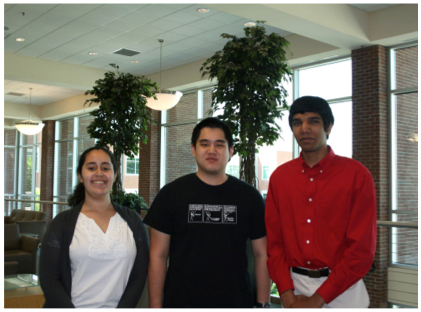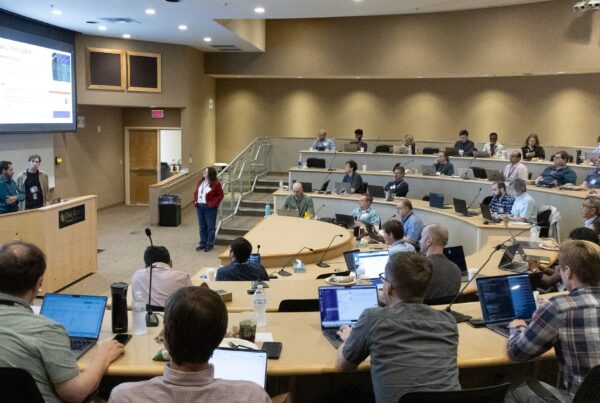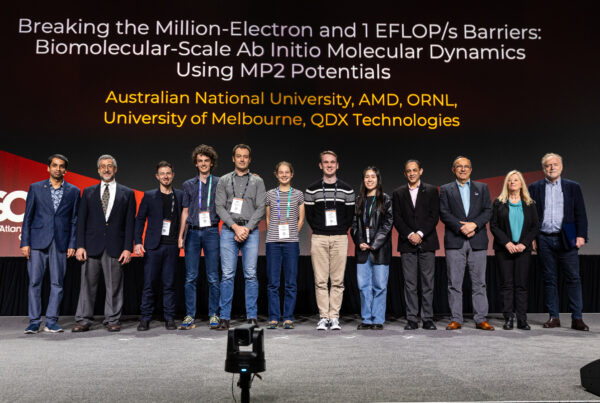
OLCF summer interns (left to right) Marcela Crosariol, Kevin Song, and Jeremy Anantharaj represent the User Assistance and Outreach Group, Computer Science Research Group, and Technology Integration Group, respectively.
OLCF summer interns gain skills and experience advancing HPC
Every summer, students from across the nation and around the globe arrive at the Oak Ridge Leadership Computing Facility (OLCF) as interns—hungry for knowledge, skills, and experience.
Staff members at the OLCF, a US Department of Energy (DOE) Office of Science User Facility, enjoy the process of mentoring and developing students through the OLCF’s annual summer internship program, which helps these students become a part of the nation’s next generation of scientists, technicians, and engineers. Students from various fields of study—computer sciences, mathematics and statistics, engineering, physics, and social and behavioral sciences—are challenged with a variety of projects that help prepare them for their professional careers. In return, summer interns provide support to help OLCF meet its mission of accelerating scientific discovery and engineering progress using leadership-class high-performance computing (HPC) systems.
More than 30 students completed summer internships at the OLCF in 2015, including Douglas Aaser, Jeremy Anantharaj, Aaron Barlow, Andrew Bowers, Shawn Cox, Marcela Crosariol, Mindy Earnest, Jonathan Freed, Benjamin Klein, William McElmurray, Samuel Migirditch, Broxton Miles, Christopher Muzyn, Sarah Neuwirth, Bin Nie, Miki Nolin, Ellias Palcu, Benjamin Smith, Kevin Song, Kun Tang, Christina Thiessen, Thomas-Allan Tison, Joel Venzke, Lipeng Wan, and Michael Wilder.
Three of these interns shared their summer experiences, individual projects, and plans before returning to their respective universities at the end of the summer.
Marcela Crosariol
Marcela Crosariol joined the User Assistance and Outreach Group, coming all the way from Brazil to provide OLCF users with technical support.
After helping her mentor, Fernanda Foertter, develop user tutorials for Titan—the OLCF’s flagship supercomputer—she began to develop tutorials for Summit, the OLCF’s next-generation computing system set to be operational to DOE’s Oak Ridge National Laboratory (ORNL) in 2018. The tutorial will assist users in accelerating their programs to make them run faster and more efficiently on the new system.
For Crosariol, interning at OLCF and working on these tutorials was a unique experience.
“Here, I’ve had the opportunity to apply what I’ve learned in school and learn many things like parallel programming that I hadn’t had the opportunity to learn before,” Crosariol said. “I’ve had the opportunity to work with this powerful supercomputer and learn from many competent professionals and scientists. It’s very cool. In Brazil, we don’t have so many supercomputers.”
After completing her degree in system analysis and design from Sao Jose Dos Campos Technological College during the current school year, Crosariol plans to seek another internship at ORNL or apply to a master’s program in computer science. Ultimately, she plans to pursue a career combining parallel programming and user outreach.
“Before I came here to ORNL, I was a bit lost about what I wanted to do in the computer science area,” Crosariol noted. “But now that I came here, I’ve seen everything that high performance computing can do, and this is what I want to learn and apply my knowledge for.”
Kevin Song
Kevin Song interned for the Computer Science Research Group in the OLCF’s Computer Science and Mathematics Division under the supervision of Manjunath Gorentla Venkata.
Song’s primary focus was developing methods for ensuring reliability on supercomputers as they approach exascale.
“As computing goes to the next scale, the supercomputing community is hitting a limit on how much power it can deliver to these computers,” Song said. “We’re trying to figure out how to predict and correct for errors that we expect to become more common due to this power issue.”
Song graduated from the University of California, Merced in May and is attending graduate school for computer science at the University of Texas at Austin this fall. Whether he pursues a career in academia or industry, he is certain that computing is in his future.
“I want to learn more about the world and how it works, and I see computer science as a very efficient route of getting there,” he said.
Jeremy Anantharaj
Jeremy Anantharaj, interning for the Technology Integration Group under the mentoring of Ross Miller, spent his summer analyzing data.
He finished working on a program that collects and analyzes performance data for the entire Atlas file system. He also developed a program that collects and analyzes I/O performance data on a per-job basis.
“When you run data on your computer, it saves it as a job, some running faster than others,” Anantharaj said. “My script will collect job data from the file system and, unlike the computer itself, it will save the data in a log file format so you can analyze old records and compare whether there’s a trend with how fast the bandwidth is changing.”
Anantharaj’s programs stand to benefit users sending large data sets in and out of the OLCF.
“I’m using a test server right now, but once my mentor and I feel that my program is ready to be used, we can run it on Titan,” Anantharaj noted. “It’ll be doing the exact same thing except on a larger scale.”
Anantharaj, a sophomore studying computer engineering at the University of Tennessee, Knoxville, certainly sees himself working in the computer industry, whether with high-performance computers like Titan or on something more specialized for a smaller company. Regardless, the internship greatly influenced his career outlook.
“Before this internship, I had no idea what they did here working with huge systems like Titan,” Anantharaj said. “Now that I’ve seen all the different ways you can use it for researching different things, I think it would be really interesting to work with supercomputers some time after I graduate. I’ve definitely started looking at my career more seriously.” – Miki Nolin
Oak Ridge National Laboratory is supported by the US Department of Energy’s Office of Science. The single largest supporter of basic research in the physical sciences in the United States, the Office of Science is working to address some of the most pressing challenges of our time. For more information, please visit science.energy.gov.





